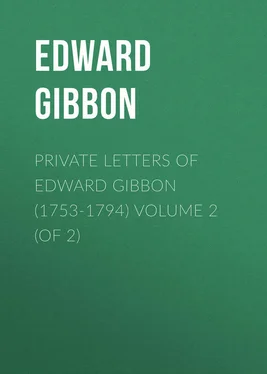Edward Gibbon - Private Letters of Edward Gibbon (1753-1794) Volume 2 (of 2)
Здесь есть возможность читать онлайн «Edward Gibbon - Private Letters of Edward Gibbon (1753-1794) Volume 2 (of 2)» — ознакомительный отрывок электронной книги совершенно бесплатно, а после прочтения отрывка купить полную версию. В некоторых случаях можно слушать аудио, скачать через торрент в формате fb2 и присутствует краткое содержание. Жанр: foreign_antique, foreign_prose, на английском языке. Описание произведения, (предисловие) а так же отзывы посетителей доступны на портале библиотеки ЛибКат.
- Название:Private Letters of Edward Gibbon (1753-1794) Volume 2 (of 2)
- Автор:
- Жанр:
- Год:неизвестен
- ISBN:нет данных
- Рейтинг книги:3 / 5. Голосов: 1
-
Избранное:Добавить в избранное
- Отзывы:
-
Ваша оценка:
- 60
- 1
- 2
- 3
- 4
- 5
Private Letters of Edward Gibbon (1753-1794) Volume 2 (of 2): краткое содержание, описание и аннотация
Предлагаем к чтению аннотацию, описание, краткое содержание или предисловие (зависит от того, что написал сам автор книги «Private Letters of Edward Gibbon (1753-1794) Volume 2 (of 2)»). Если вы не нашли необходимую информацию о книге — напишите в комментариях, мы постараемся отыскать её.
Private Letters of Edward Gibbon (1753-1794) Volume 2 (of 2) — читать онлайн ознакомительный отрывок
Ниже представлен текст книги, разбитый по страницам. Система сохранения места последней прочитанной страницы, позволяет с удобством читать онлайн бесплатно книгу «Private Letters of Edward Gibbon (1753-1794) Volume 2 (of 2)», без необходимости каждый раз заново искать на чём Вы остановились. Поставьте закладку, и сможете в любой момент перейти на страницу, на которой закончили чтение.
Интервал:
Закладка:
64
Observations on the Commerce of the American States. The pamphlet was written by Lord Sheffield, but published anonymously (London, 1783, 8vo). It reached a sixth edition in 1784, and was translated into both French and German. In it Lord Sheffield opposed Pitt's plan of relaxing the navigation laws in favour of America.
65
Gibbon's dog.
66
The Abbé Raynal (1713-1796) published in 1770 his Histoire philosophique des établissements et du commerce des Européens dans les deux Indes . The work was put on the Index for its anti-religious tendency. His book, says Michelet, was for twenty years the Bible of two worlds. Toussaint l'Ouverture learned passages from it by heart; Bernardin de St. Pierre was inspired by it; to its author Napoleon Bonaparte dedicated in 1787 his manuscript Essai sur l'histoire de la Corse . Dr. Johnson, according to Hannah More, refused to shake hands with the Abbé. "Sir," he said to a friend, "I will not shake hands with an infidel!" Raynal published a new edition in 1780, which was still more outspoken in its religious and political views. In consequence he was obliged to leave France, and settled in Switzerland. In 1788 he returned to France, and died in 1796.
67
Simon André Tissot (1728-1797) was one of the most skilful physicians of the day, excelling, says Madame de Genlis, alike in the theory and practice of his art. Among his voluminous works in Latin and French were Avis au peuple sur sa santé (1761), and De valetudine litteratorum (1766), which he translated into French under the title of De la santé des gens de lettre (1769).
68
Baron Sheffield of Dunamore (1781) was, in September, 1783, created Baron Sheffield of Roscommon, with remainder to his daughters severally. His heir was at this time his daughter, the Hon. Maria Holroyd, afterwards Lady Stanley of Alderley.
69
The north-east wind.
70
Lady Elizabeth Foster.
71
Sir Andrew Snape Hamond, R.N., created a baronet in December, 1783, for his services in the American War, was apparently treating for the seat of Lymington.
72
Lord Sheffield's Observations . See note to Letter 481.
73
Sébastien Mercier (1740-1814) was the author, among other works, of L'An 2440 , a dream of the future (1771), and of the Tableau de Paris (1781), in which he advocated many useful reforms. For this latter work he was prosecuted, and took refuge in Switzerland.
74
The Prince de Ligne (1735-1814) served with distinction as a general of the Austrian troops in the Seven Years' War and the War of Bavarian Succession. He was noted for his wit, and was a voluminous author both in prose and verse. He died at Vienna during the Congress in 1814.
75
Sir H. Burrard, Bart., the proprietor of the preponderating interest in borough of Lymington.
76
Lord Sheffield was sitting on a Select Committee appointed to inquire into frauds committed on the revenue.
77
Early in 1781 two committees of the House of Commons were appointed to inquire into the affairs of India. One, a Select Committee, considered the best means of governing the British possessions in the East Indies; the other, a Secret Committee, inquired into the causes of the war in the Carnatic, and the condition of the British possessions in those parts. On April 9, 1782, the Lord Advocate, Henry Dundas, the chairman of the Secret Committee, moved that the reports of that committee be referred to a committee of the whole House. On April 25 he laid three sets of resolutions on the table. The first set, which were postponed, related to the general misconduct of the Company; the second set, condemning the administration of the Presidency of Madras, was voted; the third, containing criminal charges against Sir Thomas Rumbold, the President of the Madras Council, was also voted. On these two sets of resolutions was founded a Bill of pains and penalties (April 29) against Rumbold; but on July 1, 1783, a motion was carried to adjourn the further consideration of the Bill till October 1. The proceedings, therefore, fell to the ground and were not resumed.
Meanwhile, the resolutions as to the general misconduct of the Company were severally agreed to by the House on May 28, 1782. On them was founded a resolution, calling on the directors to remove Warren Hastings, Governor-General of India, and William Hornsby, President of the Council of Bombay. This resolution being carried, the directors passed an Order of Recall; but the order was rescinded on October 31 by the General Court of Proprietors.
Side by side with these proceedings, the reports of the Select Committee were also considered. On April 24, 1782, their chairman, General Smith, presented a series of resolutions which were carried, and on them an address was presented to the king to recall Sir Elijah Impey, Chief Justice of the Supreme Court of Bengal.
On November 20 and 26, 1783, Fox brought in two India Bills: (1) vesting the affairs of the Company in the bands of seven commissioners; (2) providing for the better government of the territorial possessions of the Company. The first Bill passed the House of Commons on a division of 208 to 102, after long debates, in which the House frequently sat till 5 a.m., on December 8, 1783, and was carried up to the House of Lords on December 9. The first reading took place on December 9, and the second reading on December 15. A motion for adjournment was carried against the ministers by 87 to 79, and on December 17 the Bill was rejected by 95 to 76.
On the following day the king called upon the Secretaries of State to resign their seals; and on the 19th the rest of the Cabinet were dismissed.
The new Ministry was thus composed: —
William Pitt First Lord of the Treasury and Chancellor of the Exchequer.
Earl Gower President of the Council.
Lord Thurlow Lord Chancellor.
Lord Sydney} Secretaries of State.
Marquis of Carmarthen }
The Duke of Rutland Lord Privy Seal.
Lord Howe First Lord of the Admiralty.
Duke of Richmond Master of the Ordnance.
Henry Dundas Treasurer of the Navy.
The first seven on the list formed the Cabinet.
The Duke of Dorset replaced the Duke of Manchester as Ambassador at Paris, and Daniel Hailes succeeded Anthony Storer as Secretary to the Legation.
Lord Temple, the "stormy petrel" of politics, accepted office as Secretary for the Foreign Department on December 19, but resigned on December 22.
78
The Hon. George Augustus North (afterwards Lord Guilford) and Lord Lewisham were two of the seven commissioners named in Fox's India Bill.
79
This letter, as printed here, was written by Edward Gibbon to his stepmother; a similar letter, in which some of the same phrases are repeated, is printed in Lord Sheffield's edition of Gibbon's Miscellaneous Writings (vol. ii. pp. 340-344), addressed to his aunt, Miss Catherine Porten.
80
His aunt, Miss Porten, and his stepmother.
81
His aunt, Miss Hester Gibbon.
82
William Woodfall, formerly assistant editor of the Public Advertiser , was at this time editor of the Morning Chronicle . He was called "Memory Woodfall" from his accuracy in remembering the speeches in Parliament, of which no notes were then allowed to be taken. He was, it is said ( Auckland Correspondence , vol. iii. p. 165), for many years paid £400 a year, "for giving the speeches of Mr. Fox and Mr. Sheridan much more at length and better than he did those of Mr. Pitt and Mr. Dundas." He was afterwards editor of a paper called The Diary , which failed. He died in 1803. His brother, Henry Woodfall, published the Letters of Junius .
Читать дальшеИнтервал:
Закладка:
Похожие книги на «Private Letters of Edward Gibbon (1753-1794) Volume 2 (of 2)»
Представляем Вашему вниманию похожие книги на «Private Letters of Edward Gibbon (1753-1794) Volume 2 (of 2)» списком для выбора. Мы отобрали схожую по названию и смыслу литературу в надежде предоставить читателям больше вариантов отыскать новые, интересные, ещё непрочитанные произведения.
Обсуждение, отзывы о книге «Private Letters of Edward Gibbon (1753-1794) Volume 2 (of 2)» и просто собственные мнения читателей. Оставьте ваши комментарии, напишите, что Вы думаете о произведении, его смысле или главных героях. Укажите что конкретно понравилось, а что нет, и почему Вы так считаете.












